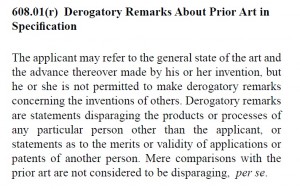It is well established that a patentee may limit the scope of the claims by disavowal, and one of the many ways such disavowal can occur is by criticizing the prior art. When a patent specification criticizes the prior art, it is presumed that the invention does not share the criticized featuers. Thus in Chicago Board Options Exchange, Inc., v. International Securities Exchange, LLC., (Fed. Cir. 2012) the Federal Circuit affirmed the district court’s finding of disavowal noting that “the specification goes well beyond expressing the patentee’s preference for a fully automated exchange over a manual or a partially automated one, and its repeated derogatory statements about the latter reasonably may be viewed as a disavowal of that subject matter from the scope of the Patent’s claims.” Criticism of the prior art also limited the claims in In re Abbott Diabetes Care, Inc., (Fed. Cir. 2012), but this time to the applicant’s advantage. Abbott successfully argued that the broadest reasonable interpreation of its claims on appeal was at least in part limited by its criticism of the prior art.
A patent prosecutor should be aware of the limiting effect of criticisms of the prior art. Sometimes they help the applicant (Abbott), but sometimes they hurt (Chicago Board). Like most things in the law, an absolute rule against being critical of the prior art is not appropriate, but it must be done carefully and thoughtfully. Moreover, a good prosecutor will recall that the MPEP prohibits disparagement of the prior art:
Maybe Mom had the best advice for prosecutors. . . “If you can say anything nice, don’t say antyhing at all.”

